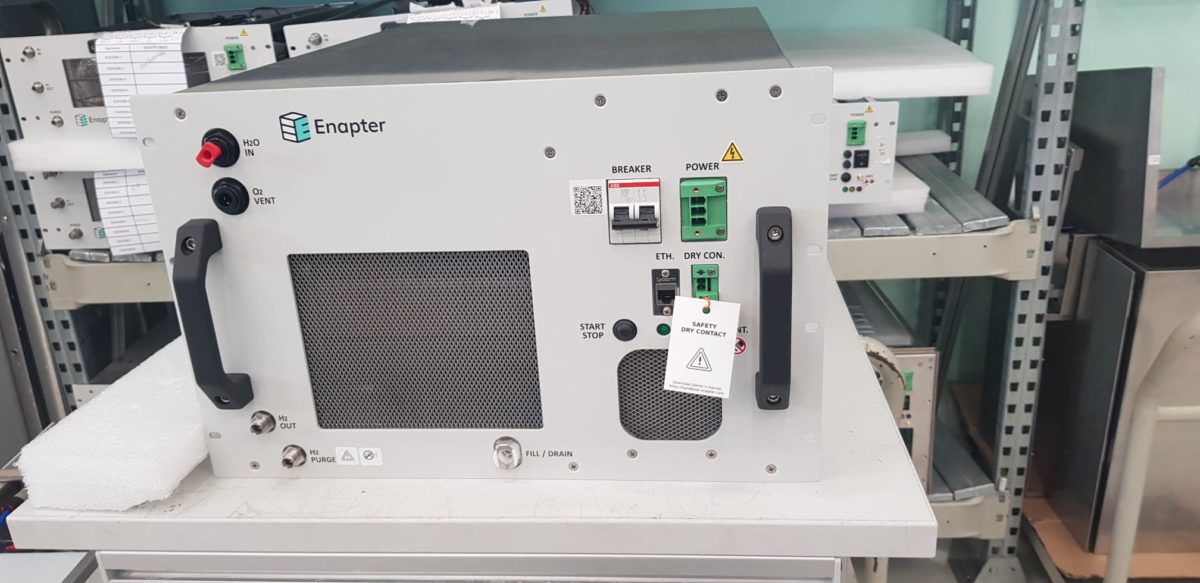Chinese solar companies including Longi Green Energy are increasing investments in electrolyzer production to slash prices and production costs, according to the Bloomberg Green unit of the U.S.-based business data service. The news service has run an article based on an interview with Wang Yingge, deputy general manager of Longi’s hydrogen energy technology unit. Longi reportedly plans to build 1.5 GW of production capacity of electrolyzers next year, up from 500 MW today, to account for more than 60% of global electrolyzer installations next year. The Bloomberg article emphasized, however, Chinese companies are lacking the public support they received to trigger the nation's solar and wind industries.
U.S.-based Air Products has awarded Germany's Thyssenkrupp Uhde Chlorine Engineers a contract to supply a more than 2 GW electrolysis plant for a green hydrogen project at Saudi Arabia’s new city, Neom. “Under this contract, Thyssenkrupp will engineer, procure and fabricate the plant based on their large scale, 20 MW alkaline water electrolysis module,” the German business said yesterday. “Upon commissioning, the project partners – Neom, [Saudi energy company] ACWA Power, and Air Products – will operate the facility, which will produce hydrogen to be synthesized into carbon-free ammonia for export exclusively by Air Products to global markets.” The start of production is scheduled for 2026. “With our large scale standard module size and gigawatt cell manufacturing capacity per year, together with our joint venture partner [Italian sustainable energy company] De Nora we are able to deliver large-capacity projects today,” said Denis Krude, CEO of Thyssenkrupp Uhde Chlorine Engineers.
U.K.-based green hydrogen energy company Protium has announced it will deploy its first 100 kW electrolyzer in the U.K. by April. The electrolyzer will be sourced from German manufacturer Enapter. “Dubbed project pioneer, the project will see Protium deploy the Enapter Electrolyser 2.1 which will be the largest integrated Enapter electrolyser in the field in the U.K.,” wrote Protium today, adding the generation of electrolytic hydrogen at scale will happen at Cardiff University’s newly established Hydrogen Propulsion Centre, in South Wales. Protium recently announced £2.65 million (€3.1 million) funding to decarbonize operations at the Bruichladdich distillery, on the Hebridean island of Islay. The company is also working on a 40 GW project in Teesside, England by 2026.
Popular content
Australian green energy company Port Anthony Renewables’ oversubscribed capital raising exercise has put a fresh AU$3 million [€1.9 million] directly into its commercial scale hydrogen precinct ahead of a planned Australian Securities Exchange listing next year. “The investor enthusiasm not only highlights excitement around the strategy at Port Anthony but the growing, global interest in hydrogen – especially green hydrogen – as the clean fuel of the future,” Port Anthony wrote yesterday. “The company had originally sought to raise [AU]$2.5 million but subscriptions totaled some [AU]$6 million just 48 hours after launching the cap[ital] raise.” Port Anthony is developing a commercial scale green hydrogen manufacturing and export hub less than 200km east of Melbourne and 78km from the Gippsland Basin natural gas pipeline network which carries domestic gas as well as fuel for export. Australian hydrogen companies, including Aviation H2, are seeking to raise capital. Several listings of Australian hydrogen companies are planned for 2022.
Netherlands-based chemicals producer Nobian and Australian multinational Macquarie’s Green Investment Group (GIG) are joining forces to form the Hydrogen Chemistry Company (HyCC). “Through this partnership, the companies are taking a unique step by creating a company that is specialized in water electrolysis to produce green hydrogen from renewable power at an industrial scale,” wrote GIG today. “With Nobian’s experience in large scale electrolysis and GIG’s resources and project development experience, HyCC will be able to accelerate investments and the development of more large scale projects.” HyCC will launch with a pipeline of more than 400 MW of electrolysis projects. The biggest is in Rotterdam, to replace fossil-fuel-powered hydrogen. GIG and Nobian will each have a 50% share in HyCC. The deal is expected to close in March.
This content is protected by copyright and may not be reused. If you want to cooperate with us and would like to reuse some of our content, please contact: editors@pv-magazine.com.


By submitting this form you agree to pv magazine using your data for the purposes of publishing your comment.
Your personal data will only be disclosed or otherwise transmitted to third parties for the purposes of spam filtering or if this is necessary for technical maintenance of the website. Any other transfer to third parties will not take place unless this is justified on the basis of applicable data protection regulations or if pv magazine is legally obliged to do so.
You may revoke this consent at any time with effect for the future, in which case your personal data will be deleted immediately. Otherwise, your data will be deleted if pv magazine has processed your request or the purpose of data storage is fulfilled.
Further information on data privacy can be found in our Data Protection Policy.